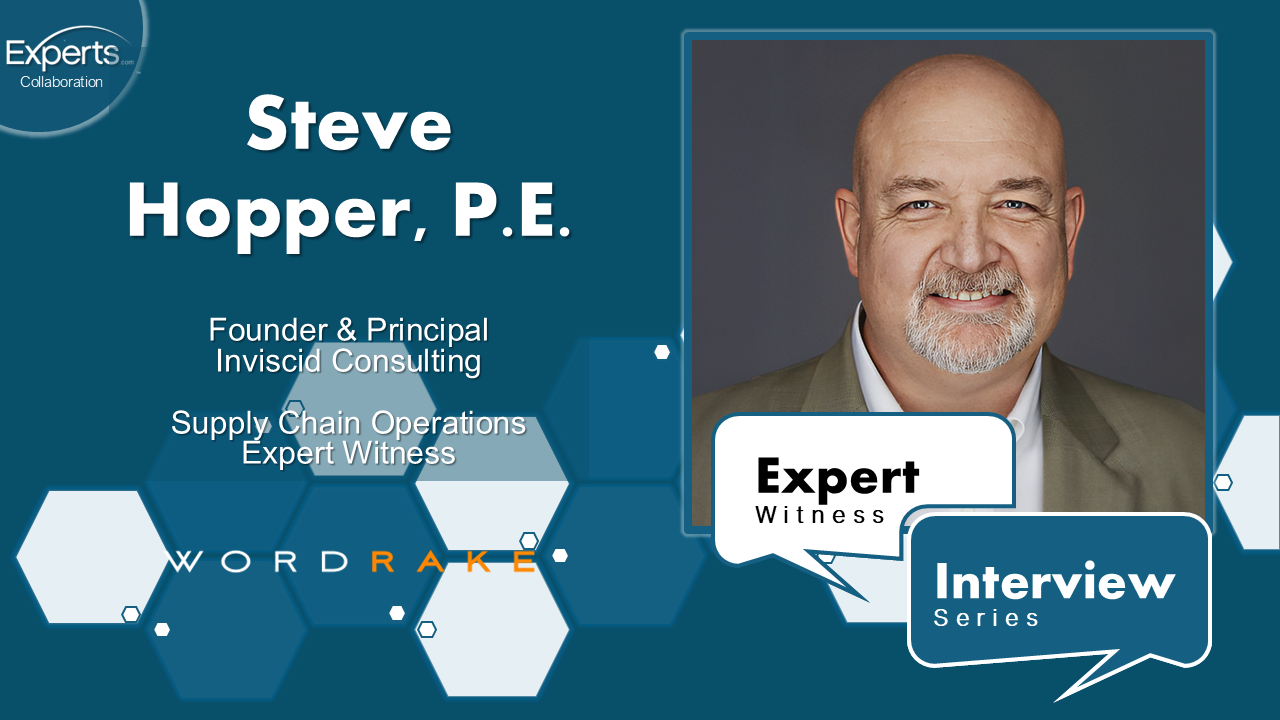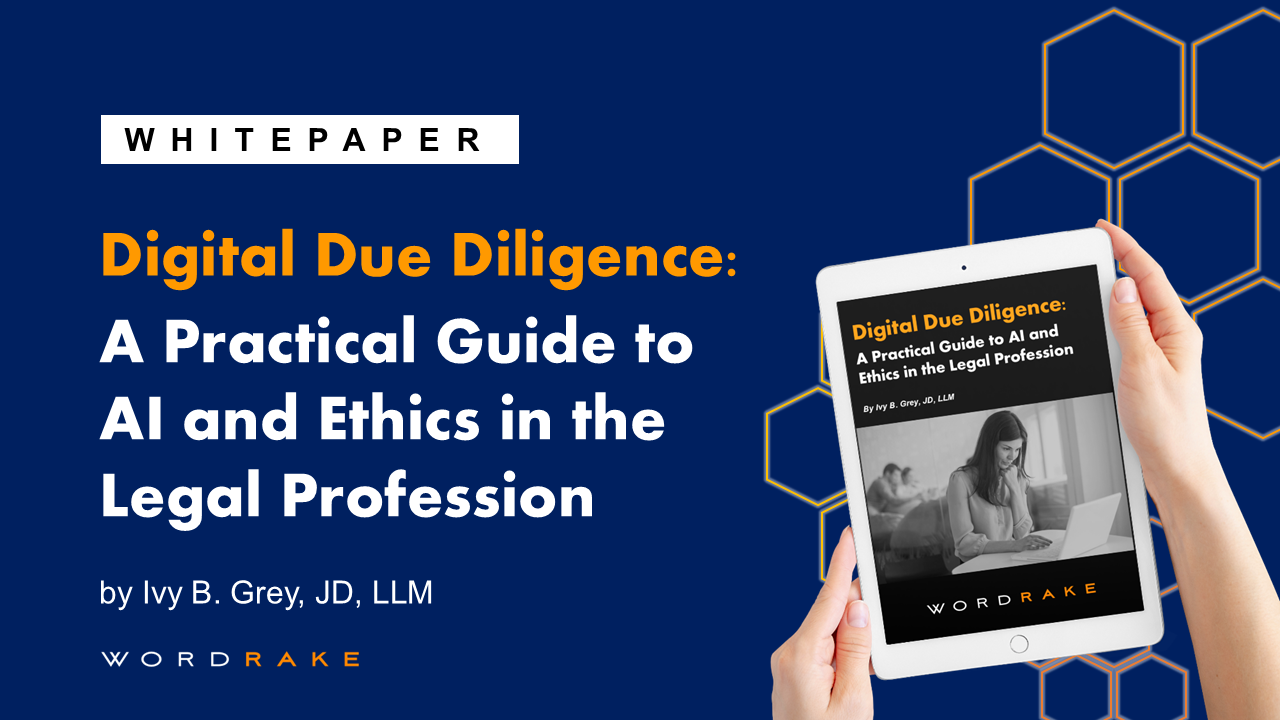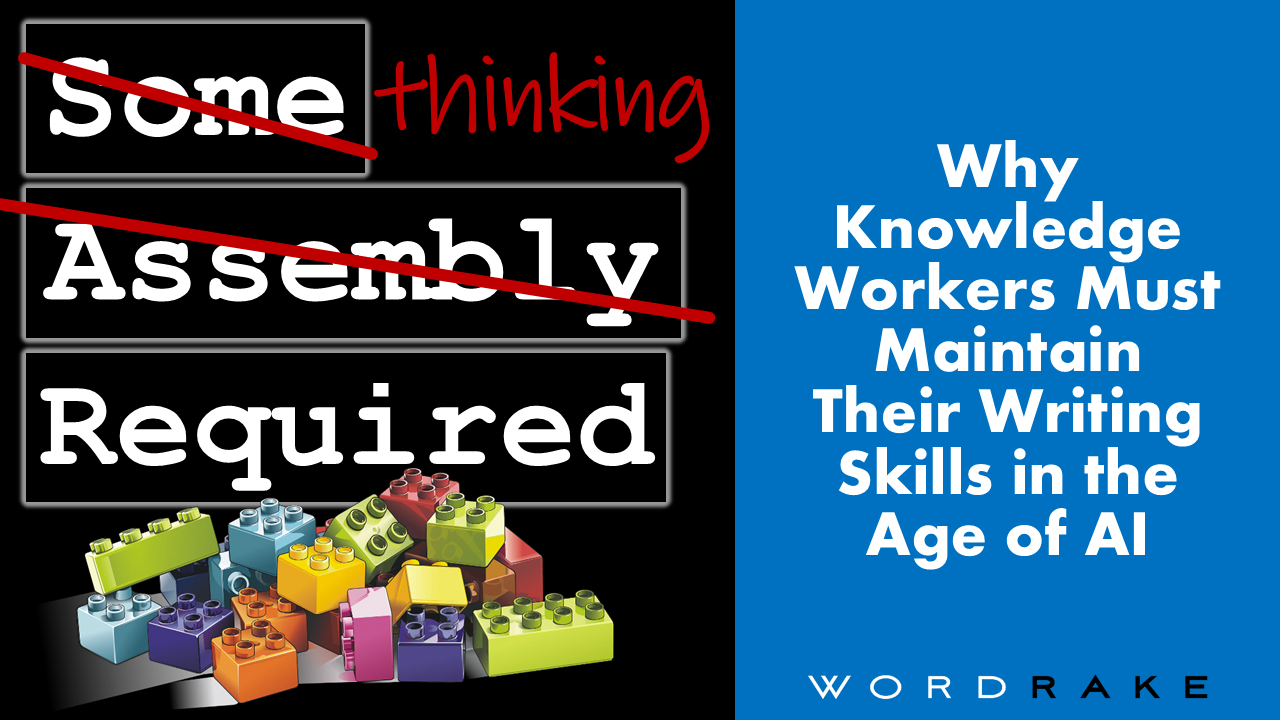Steve Hopper, P.E. is an expert witness and business consultant in the Supply Chain Operations industry with over 35 years of experience. He is the Founder and CEO of Inviscid Consulting, whose mission is to streamline warehouse, logistics, manufacturing, and distribution operations through supply chain science, industrial engineering principles, and the highest ethical and professional standards. Learn about his business operations and expert witness takeaways.
What is your professional background, and how did you become an expert witness?
I’m a licensed Professional Engineer (P.E.) with nearly four decades of experience helping businesses plan and improve their supply chain operations. I founded Inviscid Consulting in 2004, and our mission is to help businesses drive down operating costs and improve service levels in their warehousing, fulfillment, distribution, and logistics operations. I’ve helped over 200 clients over my career, from startups to Fortune 100 companies.
My expert witness practice developed naturally from my consulting work. Attorneys began seeking my expertise to help clarify what went wrong in these operations. I help them by explaining common industry practices to attorneys, judges, jurors, and arbitrators in laypeople’s terms. Over time, I formalized this part of my practice in Inviscid, and since then, I have served as an expert witness on over 50 cases in the U.S., Canada, and Australia.
What kinds of cases do you typically work on, and why do attorneys or law firms seek your expertise?
I am typically retained when there is a question of negligence, breach of contract, damages, operational failure, misappropriation of intellectual property, or a similar dispute. I’ve worked with a wide range of attorneys, from large national firms to individual lawyers. I’ve also worked on behalf of both plaintiffs and defendants. Attorneys tell me they hire me for my credentials combined with my deep and highly specialized domain expertise in supply chain operations. One attorney told me that this combination is rare, and I take that as a compliment and a professional responsibility.
What kinds of documents do expert witnesses write?
The many documents I prepare for attorneys and their clients depend on the specific needs of a client and the rules established by the jurisdiction of the case. These documents often include written affirmative reports, rebuttal reports, declarations, and affidavits. Depending on the case, I might prepare demonstrative exhibits or presentation materials that can be used at hearings. My documents and exhibits must be clear, precise, and consistent with the underlying facts of the case.
How do you prepare to write an expert witness report?
My first step is to thoroughly review the facts of the case to understand the dispute, claims, defenses, and other relevant issues within the context of my own expertise. Then I discuss the case with the attorneys who retained me so I can understand the desired scope of my report. Next, I consider relevant laws and regulations, industry standards, and published materials, as well as my own experience and analysis. These steps make up the foundation of my report and help to ensure that my professional opinions are reasonable, logical, persuasive, and defensible.
Why is it important to be a strong writer when you are an expert witness?
The “triers of the fact” (i.e., the judge, arbitrators, and/or jurors serving on the case) are unlikely to be experienced professionals in my industry. It’s my job to convey esoteric and potentially complex standards and concepts in a way that people from outside my field can understand. When I write and submit a clear, well-written expert report, I am giving them reliable, helpful information so they can make fair and sensible legal decisions.
What's the most important element of an effective expert report?
In a word, it’s credibility. Every element of my report—from organization to analysis to conclusions to opinions—should show that I am independent, qualified, and unbiased. Expert witness reports must withstand reasonable scrutiny and help the triers of the fact.
Are expert witness reports different for civil and criminal cases?
Most of my expert witness work has been in civil cases—one party versus another—although in one matter I was asked to give opinions on technical and operational issues in a criminal case involving a warehousing operation. Whether a case is civil or criminal, I approach all my reports using the philosophies and standards I mentioned previously.
What surprising mistakes in an expert report can hurt your credibility?
I believe that credibility begins with independence. Experts should offer only impartial, fact-based opinions; these opinions cannot be inflammatory. We must advocate only for the truth, not for one party or another. I have reviewed reports from other expert witnesses that were biased and advocated for the party who hired them.
Inconsistent terminology and unnecessary jargon in a report can also undermine an expert witness’s credibility, and even minor issues like typos, formatting errors, and excessive verbosity can compromise an expert witness’s professionalism.
What do you think about using AI in expert witness writing? Are there ethical methods for implementing it in your practice?
AI is similar to other useful tools like libraries, search engines, and spell checkers: used responsibly, they can help refresh an expert’s memory and refine his or her language. But the content of a report must reflect the expert’s own knowledge. AI tools can’t replace a true expert’s personal education, training, skills, research, or experience, so they should never be a substitute for sensible reasoning or analysis. The expert report must be the expert’s own convictions and voice, not those of an AI tool.
How do you avoid overwhelming non-expert readers with technical language?
My goal is to write reports that are accurate and easily understood. When I am writing and editing an expert report, I ask myself this important question: “Would a judge, arbitrator, or juror who doesn’t have my level of education, training, skills, research, and experience in this field understand what I’m trying to say here?” If the answer is no, then I work harder to write more effective content. For example, I define obscure industry terms and acronyms the first time I use them in a report.
What role does reputation play in getting hired repeatedly as an expert witness?
As a supply chain operations consultant (which is my primary career role), my professional reputation is everything. To be candid, I can’t afford to hurt my reputation by doing a poor job as an expert witness or by having my testimony excluded if a credible Daubert motion is filed against me by an attorney. As with my consulting clients, attorneys who retain me want an expert who is technically competent, professional, responsive, impartial, and credible, even under pressure. Since writing plays a key role in shaping an expert’s reputation, well-written expert reports result in repeat engagements, both as a consultant and as an expert witness.
How does online visibility—like directories or profiles—help attorneys find you and evaluate your practice?
Online directories and profiles can give more attorneys a snapshot of my expertise and credentials. In my experience, a good profile can also help attorneys understand which characteristics differentiate me from other experts. These are the reasons I maintain a personal profile on Experts.com.
Have you ever had to revise a report after feedback that it wasn't clear or persuasive enough? What did you learn?
Yes. I’ve written close to twenty expert reports, and attorneys have occasionally asked me to make edits. Since I’m not an attorney, they were usually minor edits to ensure that the language in my report was proper for a legal setting. A couple of attorneys who retained me, however, asked me to include inflammatory or provocative language to advocate for their clients. When that happened, I refused. I had to remind them it isn’t my place to be their client’s biased advocate.
What is unique about working with attorneys as an expert witness?
In my experience, many attorneys are like the general public—they think supply chain operations (warehousing, fulfillment, distribution, and logistics) are a lot simpler than they actually are. They aren’t familiar with the science, complexities, technologies, and nuances of the industry. I sometimes spend a lot of time explaining these concepts to attorneys who retain me to help them have a better grasp of the subject and be more successful in their cases.
What information do you wish lawyers would give you when initially contacting you about a potential engagement?
I wish attorneys would always send me the actual complaints filed. If I can review the complaint before an attorney interviews me, then I’ll be able to help him or her understand whether I’m the right expert for their needs and share my initial insights. If I’m not the right expert, I might be able to recommend someone who is. In addition, I wish attorneys would always identify the specific parties in their cases so I can make them aware of any potential conflicts. It’s not unusual for me to have an interview with an attorney without knowing these things beforehand.
What kinds of long-term relationships have you built with the attorneys and law firms you have worked with?
I have built mutually respectful relationships with nearly all the attorneys who have retained me. While these relationships are usually friendly, they are strictly professional. It would be inappropriate for any such relationship to affect my objectivity as an expert witness.
What are the top 3 skills an expert witness must have for success?
Here are my top 3:
1. Strong, relevant expertise – Expert witnesses must know their field. I have been told often that faking it will produce disastrous results for everyone involved.
2. Great communication skills – Expert witnesses must be able to explain their knowledge effectively in the context of the case and offer well-thought-out opinions, both in writing and in verbal testimony.
3. Composure – Expert witnesses must be confident but not arrogant. We must have thick skin and stay calm under pressure. Opposing attorneys may nitpick our reports and attempt to discredit us, especially during depositions or cross-examination.
What's the most valuable lesson you've learned as an expert witness?
One of the most valuable lessons I’ve learned is that litigation often stems from operational decisions that, in hindsight, created unintended consequences or vulnerabilities for some of the parties. I’ve realized that this truth applies to businesses of all sizes, as well as to individuals in all kinds of roles. Every one of the cases on which I have served as an expert witness would have been prevented if each party had made reasonable decisions and/or been fair to the other party. As an expert witness, it’s my job to help a judge, arbitrator, and jury understand not just what went wrong and why, but also how reasonable practices and common sense could have prevented the issue.
About the Author
Meet Stephen (Steve) T. Hopper, P.E., your guru for supply chain operations. Steve is the visionary leader of Inviscid Consulting, a firm whose mission is simple and laser-focused: Empower businesses to drive down costs and boost service levels in their warehousing, fulfillment, distribution, and logistics operations.
Steve’s entire career of nearly four decades has been devoted to this mission, and he has advised hundreds of clients ranging from small businesses to Fortune 100 corporations, guiding them toward achieving these goals. He has also served as an expert witness on dozens of cases involving supply chain operations in the US, Canada, and Australia, and has advised private equity and venture capital investors.
Visit Steve's Experts.com profile and connect with him on LinkedIn.









